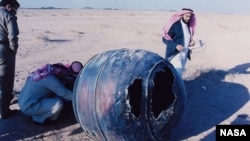The United States is joining the European Union and spacefaring nations to advance an International Code of Conduct for Outer Space Activities because the long-term sustainability of our space environment is at serious risk from space debris and irresponsible actors.
President Barack Obama’s 2010 U.S. National Space Policy directed that “The United States will pursue bilateral and multilateral transparency and confidence-building measures to encourage responsible actions in, and the peaceful use of, space.”
The United States has been consulting with the European Union over the last four-plus years. The United States views the European Union’s proposed draft Code of Conduct as a good foundation for developing a non-legally binding International Code of Conduct focused on the use of voluntary and pragmatic transparency and confidence-building measures to help prevent mishaps, misperceptions, and mistrust in space.
The U.S. Department of Defense tracks roughly 22,000 objects in orbit, of which 1,100 are active satellites – in other words, about 6,000 metric tons of debris orbiting the Earth. Some debris is simply “dead” satellites or spent booster stages still orbiting, while other types of debris result from accidents or mishaps, such as the 2009 Cosmos-Iridium collision, or from intentionally destructive events, such as China’s test in space of an anti-satellite weapon in 2007. There are hundreds of thousands of additional objects too small to track but still capable of damaging satellites in orbit and the International Space Station.
As the likelihood of collisions between space debris and active satellites increases, ”the environment around our planet will become increasingly hazardous to human spaceflight and satellites systems, which would create damaging consequences for all of us,” said Secretary of State Hillary Clinton in a written statement on January 17.
Secretary Clinton said, we are “committed to working together to reverse the troubling trends that are damaging our space environment and to preserve the limitless benefits and promise of space for future generations.”
That is why the United States will “join with the European Union and other nations to develop an International Code of Conduct for Outer Space Activities. A Code of Conduct will help maintain the long-term sustainability, safety, stability, and security of space by establishing guidelines for the responsible use of space.”
















